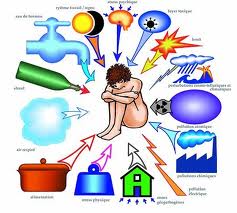Manage anxiety cleverly - it's only a normal human reaction!
Is anxiety a word we use too "anxiously"? Are we scared of being anxious? Does the word itself scare you?
Tennis psychology at work
I teach in classes at a Management School. Management, that is, management of people, is my business. Students pay big money to gain qualifications in Management. Businesses spend huge sums in improving their management performance. And yet, the things that I “teach” deal with the understanding of the simplest human behavior. Why do we need to pay so much money for this, something that is all around us?
A recent exam question concerned happiness. What makes us happy? We all know that when we are happy everything runs pretty much swimmingly. I asked my class of students at Masters Level how to get happy, stay happy. All of these students have learned the rudiments of philosophy, so I expected some profound answers. Instead I received most answers based on love relationships, and one or two family bonds. These were not the answers I was looking for.
I then threw an idea at them. What keeps anxiety at bay?

Create your own tennis product
Blank looks. Why are we talking about anxiety, when the initial question concerned happiness? The theory is that if you can combat anxiety successfully, you can be happy. In fact, you can only be happy. It doesn’t matter who you are, where you are, what miserable event is about to swallow you up, you are not anxious. So you are happy.
Pressure causes anxiety
For us humans, anxiety can be more clearly understood if we look at our animal past. Let's imagine we are once again stone-age men. Our prime needs are food and water, shelter, and…? Anything else? One of them we often forget, is protection, or another word, security, or safety. If we have someone to protect us (and not just feed us), we start glowing with happiness.

Fatigue - the most dangerous cause
So, now back to our principal theme, tennis. Where, on a tennis court, is protection, safety and security? Now the problem starts. It is nowhere to be seen. At the start of a tennis match, before you have even hit a ball, you are gripped with anxiety. Your parents love you. Your coach loves you. You had a great breakfast. You know how to hit balls. But, you forget all this. You are shivering with fear.
We shiver with fear, because we are in danger. Our future is jeopardized. We have learned how to kill our beast, but we could make an error of judgement, we could fail. Through that failure, we may starve, suffer, lose strength in the tribe. When will the inevitable downward spiral start? We will become simple hangers-on in a society that rewards winners with double protection, safety and security.

The ultimate goal - winning
The anxiety problem is really two things. One – the margins. The difference between winning and losing is a millimeter. If your opponent has greater control of any, or worse, of all, of those tennis factors, even marginally, you generally lose. You know, through experience, that even when you have won, when you have succeeded, it was a mighty fine thing. It could easily have gone your opponent’s way. There is no security in an activity that has such small, such risky, margins.
Two – the long term reason to live. You have dedicated long hours to being the best you can in tennis. You carry not only your own motivation and dedication around with you, but also the hopes of all those who support you. You are the one carrying the flame. You have made everyone proud before, you can surely do it again. Or maybe not? When you see the disappointed face of your parent, the disappointed face of your coach, you lose your role. You lose your meaning. You lose your raison d’être. Surely there is more protection, safety, security elsewhere, in other activities?
Balance your life with education
What happens if you can’t, might never, control those margins? What happens if you, too often, have to deal with disappointed family, coach and friends?
In fact, not much changes when things start turning nasty. You can still hit balls, have fun with family and friends, play matches. But the fact that you lose matches that you think you should win, or even, before, used to win? Who cares?
It’s easy for me to say. Who cares? Not only do we carry big backpacks of pride around with us, but we are in-built with a desire to be the strongest. And if not the strongest, one of the strong.
Winning culture
Any easy solutions to combat these natural processes? Yes, and no.
First, no. I firmly believe that every player, at some point, experiences anxiety to the detriment of performance. Some people seem to sail through this in a few seconds. With others it becomes a real mental illness, that surfaces at the slightest provocation. But we are not interested in the some, and the others. We want everyone, and I mean, everyone, to play tennis, and, in fact, to live, without anxiety. Tennis matches would be much more fun events for a start.
USPTR psychology
Above, I said there IS an easy solution. On a pretty much continuous process, from baby to infant to child to teenager to adult, in almost every aspect of life, not just tennis, that person must feel secure and protected. Inherent in this is the mind set that, through this security and protection, the player must challenge himself in total comfort. He must take his mishaps as an integral part of the learning process. He must take his inevitable aging, or fatiguing, or distraction with other things, as an integral part of the learning process. But his core protection will always be in place.
How many coaches, how many parents, girlfriends, boyfriends, and all the others, are good at, trained at, encouraging and maintaining this mind set?
Your body is talking.
Have A Great Story About This Topic?
Do you have a great story about this? Share it!
Five of our most popular pages
. tournament win
. finding a sponsor
. the touring pro
. the master at work
